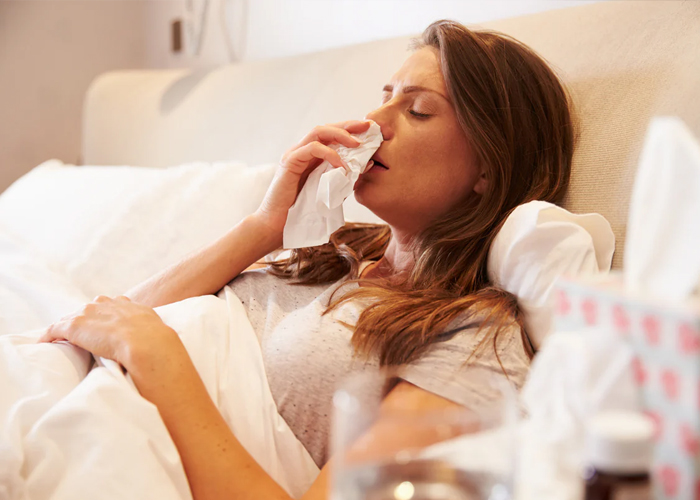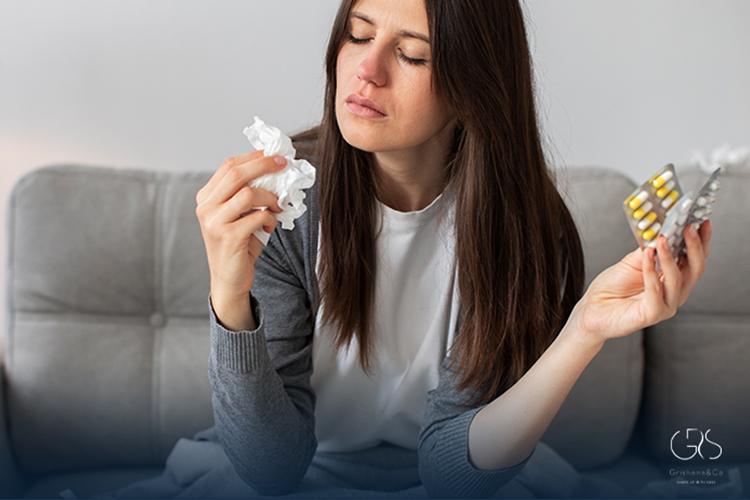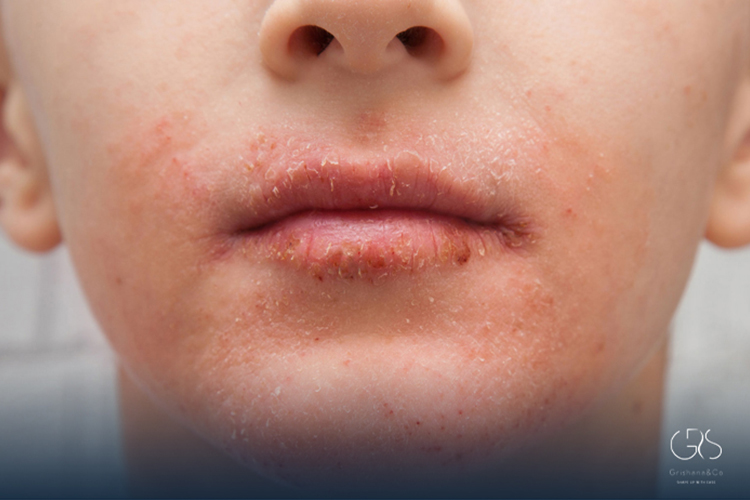Allergies can be a bothersome condition affecting millions of people worldwide. While allergy symptoms can occur at any time of the day, many individuals experience more severe symptoms during the night. This phenomenon can be attributed to several factors, including environmental circumstances and the body’s natural responses. In this article, we will explore five reasons why allergies are worse at night, discuss how allergies impact sleep and sleep apnea, and provide practical solutions to alleviate nighttime symptoms.
Causes for Nighttime Allergy Symptoms
- Having a Room With Dust or Mold: Indoor allergens such as dust mites, pet dander, and mold tend to accumulate in bedding, carpets, and upholstery. When we lie down to sleep, we become more susceptible to these allergens as they become airborne and are inhaled into our respiratory systems . Dust mites and mold thrive in humid environments, so it’s important to maintain proper ventilation, use dehumidifiers, and regularly clean bedding and surfaces to minimize exposure.
- Lying Down: When we lie flat, the effects of nasal congestion can become more noticeable, leading to difficulty breathing and disrupted sleep patterns. The position of the head exacerbates nasal congestion as mucus accumulates in the nasal passages, causing a blockage. Elevating the head while sleeping can help alleviate nasal congestion and promote better airflow.
- Sleeping With a Pet Nearby: Pets, particularly cats and dogs, can trigger allergy symptoms in individuals who are sensitive to pet allergens. Keeping pets out of the sleeping area and regularly grooming them can help minimize exposure. Using allergen-proof covers for pillows and mattresses can also help reduce the presence of pet dander in the sleeping environment.
- Tracking Pollen Inside: Outdoor allergens, such as pollen, can be brought indoors on clothing, hair, and shoes. If you have spent time outdoors during the day, pollen can cling to your clothes and be released into the air when you lie down to sleep. Changing clothes and taking a shower before bedtime can help reduce pollen exposure.
- Using a Humidifier: While humidifiers can improve dry air and help with respiratory conditions, they can also create an ideal environment for dust mites and mold to thrive. It is essential to clean and maintain humidifiers regularly to prevent allergen buildup. If allergies are a concern, using a hygrometer to monitor and maintain optimal humidity levels can help reduce allergens.
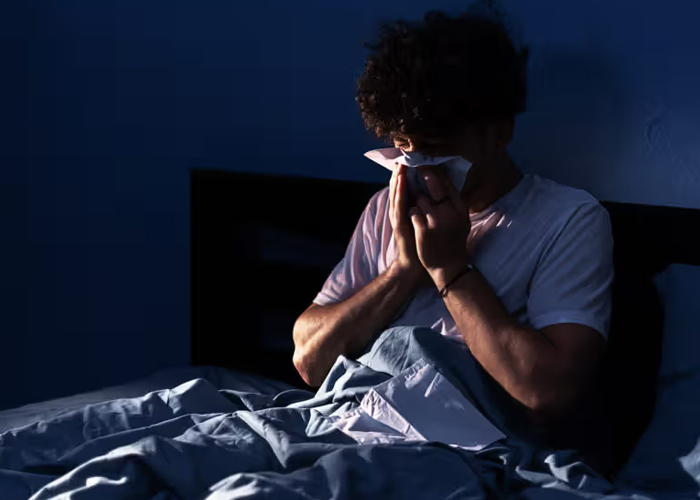
How Allergies Impact Sleep and Sleep Apnea
Allergies can significantly impact sleep quality and exacerbate sleep apnea symptoms. Nasal congestion caused by allergies can obstruct the airways, making it difficult to breathe properly during sleep. It can disrupt sleep patterns, leading to fragmented and restless sleep. In individuals with sleep apnea, the combination of allergies and sleep apnea can further contribute to sleep disturbances and daytime fatigue [^4].
Types of Allergies That Get Worse at Night
Certain types of allergies tend to worsen at night:
- Dust Mite Allergy: Dust mites thrive in bedding and upholstery, and their allergenic particles become airborne when we lie down to sleep, leading to increased exposure and symptoms .
(To learn more about Dust mites allergies please refer to this article) - Mold Allergy: Mold spores can grow in damp environments, such as bathrooms or basements. Inhaling mold spores during the night can trigger allergic reactions .
- Pet Allergy: People allergic to pet dander may experience worsening symptoms at night if they sleep with a pet nearby or have pet allergens on their bedding .
- Pollen Allergy: Pollen brought indoors on clothing or released into the air can trigger allergic reactions during the night.
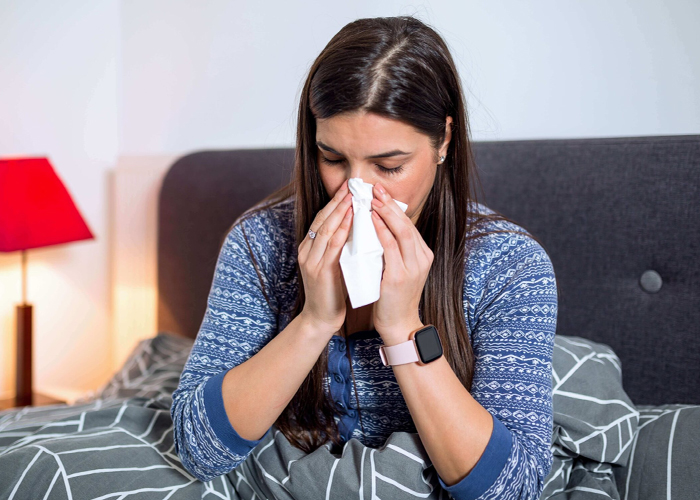
Time of Day That Allergies Peak
The severity of allergy symptoms can vary throughout the day. In general, allergies tend to be worse in the morning when outdoor allergens, such as pollen, are at their highest concentration. However, for individuals sensitive to indoor allergens, like dust mites and mold, nighttime can be when symptoms are most pronounced due to increased exposure.
How To Calm Allergy Symptoms at Night
To alleviate allergy symptoms at night and promote better sleep, consider the following measures:
- Maintain a clean sleeping environment: Regularly wash bedding at high temperatures, vacuum carpets and upholstery, and use allergen-proof covers for pillows and mattresses. These steps can significantly reduce nighttime exposure to indoor allergens.
- Minimize allergen exposure: Keep pets out of the sleeping area, use air purifiers, and keep windows closed to prevent outdoor allergens from entering the room .
- Regulate indoor environment: Keep the bedroom well-ventilated by opening windows during the day, using dehumidifiers to control humidity levels, and running air conditioning units with HEPA filters to reduce allergen concentration.
- Elevate the head while sleeping: Use an extra pillow or a wedge-shaped pillow to promote better airflow and reduce nasal congestion.
- Consult a healthcare provider: If symptoms persist despite home remedies, it may be necessary to consult a healthcare provider. They can provide personalized recommendations and prescribe appropriate allergy medications.
It’s important to note that individual experiences with allergies can vary, and it’s recommended to consult with a healthcare professional for personalized advice and treatment options.
Conclusion:
Allergies can worsen at night due to factors such as indoor allergen accumulation, prolonged exposure to allergens, increased allergen concentration, the impact of posture on nasal congestion, and immune responses influenced by the body’s internal clock. These factors can disrupt sleep and exacerbate symptoms, particularly in individuals with sleep apnea. By implementing practical measures to reduce allergen exposure and using appropriate medication, individuals with nighttime allergies can improve their sleep quality and overall well-being.
Sources
- American Academy of Allergy, Asthma & Immunology, Indoor Allergens
- Mayo Clinic, Symptoms Nasal congestion
- American College of Allergy, Hay Fever
- American Lung Association, What Makes Indoor Air Unhealthy?
- National Sleep Foundation:, Allergies and Sleep


